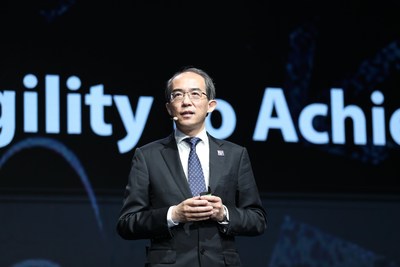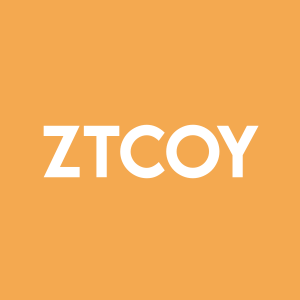ZTE President Xu Ziyang: Build Stronger Core Competence, Achieve High-Quality Growth Together
ZTE Corporation's President Xu Ziyang delivered a keynote speech at the Mobile World Congress Shanghai 2021, emphasizing the need for stronger core competencies to tackle the challenges of 5G technology and market uncertainties. He noted that 5G is still in its early stages, facing tech challenges like cost reduction and efficiency, alongside business uncertainties in monetization and application expansion. ZTE focuses on agile capabilities, digital transformation, and open cooperation with partners to achieve high-quality growth and build a robust ecosystem for shared success.
- Focus on building core competence to address technology challenges.
- Emphasis on agile capabilities for market expansion and digital transformation.
- Commitment to open cooperation with partners, promoting an ecosystem for shared success.
- 5G technology still faces significant challenges in cost efficiency and performance.
- Business uncertainties regarding monetization and expansion of industry applications.
Insights
Analyzing...
SHENZHEN, China, Feb. 23, 2021 /PRNewswire/ -- ZTE Corporation (0763.HK / 000063.SZ), a major international provider of telecommunications, enterprise and consumer technology solutions for the Mobile Internet, today announced that the company's President Xu Ziyang has delivered a keynote speech entitled "Build Stronger Core Competence, Achieve High-Quality Growth Together" at the opening ceremony of the Mobile World Congress (MWC) Shanghai 2021, which kicked off today in Shanghai, China.
According to Mr. Xu, 5G is still in its fledgling stage, and digital and intelligent transformation has already gathered full momentum. ZTE maintains the judgement that development in this stage will encounter both technology challenges and business uncertainties. Technology challenges include constantly reducing costs and increasing efficiency for 5G infrastructures, and meeting higher performance requirements for different industry applications.
To cope with technology challenges, ZTE builds stronger core competence and pursues excellence.
Challenges brought by business uncertainties refer to a series of problems that are not clearly understood, for example, the large-scale expansion, monetization, and business models of industry applications.
Facing uncertainties in market expansion, ZTE strengthens "agile" capabilities to promote the digital and intelligent transformation of vertical industries, thus lowering startup costs, making quick trials and iterations, and promoting successful models. Meanwhile, ZTE welcomes deep and open cooperation with our partners in vertical industries and the ecosystem, to achieve high-quality growth together.
Here comes the original speech as follows:
Hello, everyone. Many people may know that there is a fast-growing plant called Giant King Grass. Within the half year after it sprouts, its stem is only about one inch in height, but the roots grow over 10 meters deep underground and spread wide vigorously to absorb nutrients and accumulate energy. Once it rains, the Giant King Grass can grow over two meters high in only several days. Then, how can a company grow fast? In view of this, I would like to talk about "Build Stronger Core Competence, Achieve High-Quality Growth Together—For Digital and Intelligent Ecosystem of Shared Success." In this speech, I will share some of ZTE's innovations, practices, and thoughts, to call for all partners to make joint efforts in the 5G fledgling stage for a better future.
The year 2020 was certainly extraordinary. The strike of COVID-19 and the ever-changing global environment seemed to disrupt 5G deployment, but in fact, China and other countries that had taken preemptive actions were keeping their pace. In the fight against the pandemic, technology succeeded. For consumers, the pandemic has greatly changed the way they live and work, making ICT services a necessity, like air, water, and electricity. Enterprises then need to accelerate digital and intelligent transformation, not only to reduce costs and increase efficiency, but to become more agile and intelligent, thus better coping with the uncertainties in external environments, markets, and technologies.
Digital and Intelligent Transformation in Full Swing
After two years of commercial practices, 5G is still in its fledgling stage, and digital and intelligent transformation has already gathered full momentum. We maintain the judgement that development in this stage will encounter both technology challenges and business uncertainties. Technology challenges include: to constantly reduce costs and increase efficiency for 5G infrastructures, and to meet higher performance requirements for different industry applications. Challenges brought by business uncertainties refer to a series of problems that are not clearly understood, for example, the large-scale expansion, monetization, and business models of industry applications.
For Technology Challenges, Build Stronger Core Competence and Pursue Excellence
To cope with technology challenges, we build stronger core competence and pursue excellence.
First of all, let's take a look at the evolution of cloud-network capability based on market progress. Phase 1 refers to the first 1–3 years when 5G networks are deployed. The focus of this phase is fusion for higher efficiency. For example, multi-frequency/RAT sites, large bandwidth, high efficiency, and DSS are applied to optimize resource utilization; new materials, new processes, and AI are employed to reduce energy consumption; and enhanced uplink, edge deployment, and multi-cloud synergy are developed to facilitate market expansion. The focus of Phase 2 is intelligence and openness. As the 5G traffic load increases, ubiquitous AI, open and decoupled architecture, and edge cloud and industry applications will further promote cloud-network integration, as well as uRLLC and millimeter wave technology. In Phase 3, the popularization of 5G industry applications will raise higher requirements for cloud-network integration and stimulate continuous evolution of technologies. For example, ultra large antenna, Terahertz (THz), multi-dimensional connectivity, and AI-Native networks will emerge.
Ultimate Experience
To cope with the technology challenges, we make continuous innovations and breakthroughs for the ultimate user experience. For both consumer and business markets, the key to success is to create a brand-new experience for customers and users.
For consumers, we increase the high-rise coverage by
For vertical industry applications, we offer better access technology, like enhanced uplink of 5G networks and low-latency connectivity of PON. In the meantime, with E2E guarantee and enhanced network slicing, larger bandwidth, lower latency, and higher reliability, we can facilitate the expansion of industry applications, especially those in the OT field.
Ultimate Efficiency
Moreover, we constantly pursue ultimate efficiency, including the highest spectral, power, and network operational efficiency. These are vital for operators to reduce costs, improve efficiency, and achieve sustainable development. For example, we provide MU-MIMO with higher capacity, Cloud Radio with lower interference, SuperDSS that allows dynamic spectrum sharing among 2/3/4/5G, higher-spectral-efficiency 800 Gbps OTN with single-wavelength, AIVO to improve efficiency by incorporating AI into different network building stages, PowerPilot precision power saving to reduce power consumption by
Ultimate Core Competence
Core competence is the cornerstone of ultimate experience and ultimate efficiency. In terms of chipset, advanced manufacturing technology, packaging, and joint software/hardware design can help overcome the bottleneck of Moore's Law. With rich experience in IPs and the digital IC DevOps COT design platform, we can safeguard our core competitiveness in chipset development. Algorithms are the essence of software and also the key to higher software quality and efficiency. We will focus on high cohesion at the physical layer, ultimate performance at the network layer, and feature optimization at the service layer, and continue to improve the AI algorithm library. This will bring about continuous improvement on chipsets and algorithms, and revolutionary progress in architecture. In terms of architecture, we will keep enhancing decoupling, promote microservice architecture, and achieve data-driven evolution to AI-Native architecture.
Facing the uncertainties in market expansion, we strengthen "agile" capabilities to promote the digital and intelligent transformation of vertical industries, thus lowering startup costs, making quick trials and iterations, and promoting successful models. Meanwhile, we welcome deep and open cooperation with our partners in vertical industries and the ecosystem, to achieve high-quality growth together.
Focus on Value Creation and Scenario-Based Services Make things EASIER
When facing the challenge of business uncertainties in vertical industries, we advocate being value-driven and scenario-based to make things "EASIER".
The first "E" stands for "Elastic", indicating the elasticity of applications, agnostic migration, and flexible scale-in/out brought by single-source heterogeneity and cloud native software. "A" is short for "Agile", meaning the computing power on demand, agile innovation, and rapid iteration and replication supported by lightweight software and hardware design. "S" indicates "Secure", referring to higher security guaranteed by zero trust through intrinsic security. "I" means "Intelligent", indicating the data-driven evolution and continuous algorithm iteration empowered by ubiquitous AI. The second "E" is short for "Easy", meaning that customers can easily use the network through simple and fast deployment and maintenance. "R" stands for "Reliable", indicating the reliable performance in latency and resources guaranteed by the TSN and finer-granularity hard-slicing technologies.
Strengthen Agility, Succeed in Edge
Agility makes success. With lightweight and flexibility as its basis, agility is key to addressing uncertainties. As vertical industry applications extend to the OT field, the edge will become the major field for innovation incubation and application. As for deployment of agile edge:
In terms of hardware, on-premises gateways, embedded boards, all-in-one cabinets, and the resource pool of all-series servers can enjoy lightweight startup and expansion on demand.
Regarding software, the TECS Cloud Foundation (TCF) enhances the technical service layer and boosts computing power through lightweight, NEO hardware acceleration, and dual core engine technologies. The coordination between software and hardware realizes flexible deployment and agile innovations of AnyWhere, AnySize, and AnyService.
Fast Iteration, High-Quality Growth
To tackle uncertainties, we need comprehensive enhancement and coordination in all fields to achieve "full decoupling", "dual circulations", and "deep optimization".
"Full decoupling" indicates a further decoupled architecture based on cloud infrastructure. We employ finer-granularity components horizontally, and build a thinner PaaS layer to enable vertical decoupling of both technical service layer and general service layer.
Besides, such an architecture enables dual circulations. Cycle optimization between the technical service layer and the infrastructure layer improves the infrastructure resource utilization efficiency and the coordination efficiency of applications, safeguarding edge application scenarios despite limited resources. Moreover, the general service layer and scenario-based applications are mutually supportive. Specifically, the former enables the service development on the upper application layer through its low-code architecture. At the same time, it also accumulates public logic and algorithms from the application layer, resolving the conflict between customization and scale to some extent.
Deep optimization lowers non-efficient redundancy expenses through multimode fusion, and ensures the best infrastructure efficiency in different applications through customized off-the-shelf hardware.
Digital and Intelligent Ecosystem of Shared Success
Rainforests are the most stable and robust ecosystems on this planet. Striving for stronger core competence and high-quality growth in the 5G era, ZTE expects to build a rainforest-like ecosystem with all partners in the industry for shared success.
The industry and ecosystem require more professional coordination when facing up to business uncertainties. ZTE is committed to building a digital and intelligent ecosystem based on open underlying capabilities and more efficient collaboration, to achieve win-win with all partners. We are willing to open the capabilities of such core technologies as chipset, database, and OS, the E2E ICT product capabilities, including wireless and wired, computing power, and terminal fields, the component capabilities of AI, data and video, and 5G innovations to all industry and ecosystem partners for win-win success. As a faithful driver of the digital economy, ZTE is committed to tackling the toughest challenges to power the world with core 5G capability.
2021 marks the year of the Ox, which symbolizes resilience and perseverance in Chinese culture. It is exactly the spirit that ZTE has been carrying forward. We will remain down-to-earth and continue to keep words and actions consistent. Working closely together with the entire industry, we are bound to address all the challenges and difficulties. Thank you!
Media Contact:
Margaret Ma
ZTE Corporation
Tel: +86 755 26775189
Email: ma.gaili@zte.com.cn
![]() View original content to download multimedia:http://www.prnewswire.com/news-releases/zte-president-xu-ziyang-build-stronger-core-competence-achieve-high-quality-growth-together-301233280.html
View original content to download multimedia:http://www.prnewswire.com/news-releases/zte-president-xu-ziyang-build-stronger-core-competence-achieve-high-quality-growth-together-301233280.html
SOURCE ZTE Corporation








